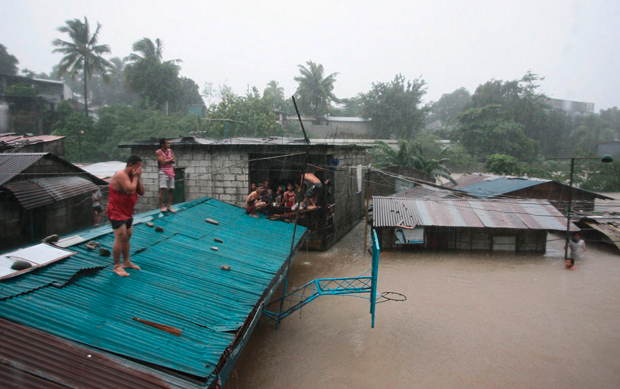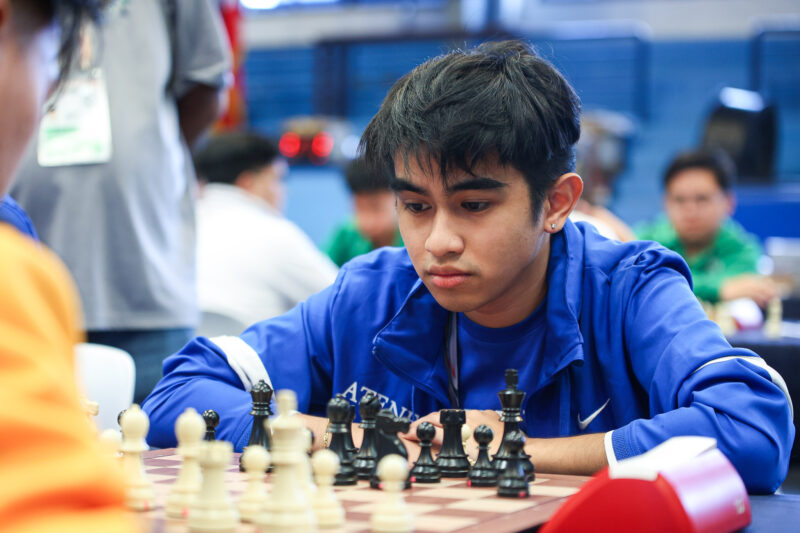
QC SUBMERGED. Serious flooding during the rainy season has been among the main concerns of residents in Quezon City. Photo by Mike Alquinto for AP Photo.
FOR 73 years now, the people of Quezon City, just like in other localities, have been exercising their right to vote for their local government officials. Its citizens are once again expected to do so as the local elections in 2013 are fast approaching.
Since 2010, the Quezon City local government has been making serious efforts to improve the city, coming up with a safer and more disaster-prepared environment for its citizens and continuously attempting to address other issues at hand.
Flooding and waste management
In early August this year, non-stop monsoon rains colloquially known as “Habagat” devastated the metro and displaced thousands of families. It caused more than P62 million worth of damages to infrastructure and public properties. Delivering more rainfall than Ondoy, which hit the country in 2009, Habagat highlighted one of the city’s major concerns: garbage disposal.
The Quezon City Council immediately redirected its focus to relief efforts for flood victims. It issued, for instance, an ordinance to authorize government employees to apply for calamity loans with the Government Service Insurance System.
For a better waste management system, the Council also implemented the Plastic Bag Reduction Ordinance, Plastic and Styrofoam Ban and Garbage Segregation Program to make the city a more sanitary place to live in.
Barangay Loyola Heights Kagawad Florentino Murao Jr. shed more light on the city’s Garbage Segregation program. “Mayroong paghihiwa-hiwalay ng basura sa barangay, ‘yung mga linis-estero. (There has been waste segregation in our barangay, and the cleaning of our streams,)” he said.
Crime rates and informal settlers
By the end of 2011, the Quezon City Police Department reported that it had solved 61.71% of all crimes in the city, a significant 9.87% increase from a 51.84% rating in 2010. This is seen as a progress in maintaining an atmosphere of security and confidence not only among citizens, but among investors as well.
In February this year, the National Drive Against Professional Squatters and Squatting Syndicates chaired by Vice President Jejomar Binay recognized the city’s efforts in addressing informal settlements, with a P50,000 cash incentive.
Binay also commended the Quezon City Council for initiating a public-private partnership in building pro-poor housing communities during the inauguration of Bistekville 2 in Barangay Kaligayahan, the city’s second major housing project.
“As of now, lahat ng mga informal settler dito ay nakaregister sa iba’t ibang ahensya at accredited. May pamilya dito na nasunugan na nabigyan ng pagkakataon na mabigyan ng bahay (All informal settlers are now registered and accredited by different agencies. A family here whose previous home caught fire has been given the opportunity to start all over with a new house),” Murao commented.
Still a long way to go
However, 53-year-old Anselmo Narciso, a Quezon City resident who works as a security guard and is a father of two, pointed out how he and his family have not benefited from these efforts that much.
“Hindi lahat natutulungan. Meron yung natutulungan pero… mas marami ‘yung hindi natutulungan. (Not all are being assisted [by the local government]. There may be some who have been helped… but more people are still not supported,)” Narciso said. “Mabagal. Kung sa mga sunog din naman, mabilis din. Kaya lang, ang nauuna e yung mga volunteer [kaysa sa gobyerno] (They [the local government] are slow. Fire accidents are handled more quickly by volunteers than by them.).”
House Representative Randolph Ting from the Third District of Region II (Cagayan Valley), who is a part-time resident of Quezon City, said informal settlement or “squatting” is still a major concern in the city. He said that the Quezon City local government must focus on promoting poverty alleviation programs such as more housing and security of tenure for workers.
Barangay Loyola Heights Kagawad Dennis Calizo also suggested some reforms in the budget allocation system, specifically in how the flow of budget down to the barangays must be done at a faster pace.
In light of May 2013
While such concerns have yet to be addressed, the people of Quezon City are looking forward to the May 2013 midterm elections, where the candidates will battle it out for their desired local government positions.
Running for city mayor are incumbent Mayor Herbert Bautista and 67-year-old bachelor Romeo Acebedo. Meanwhile, Ma. Josefina Belmonte-Alimurung is also up for her second term and is running for vice mayor unopposed.
When asked what kind of leader Narciso thinks the city needs, he replied, “Kailangan yung pipiliin na magiging leader e ‘yung marunong tumulong, ‘yung natutupad nyung pangako niya. (It should be someone who knows how to help, someone who fulfills his or her promises.)”



